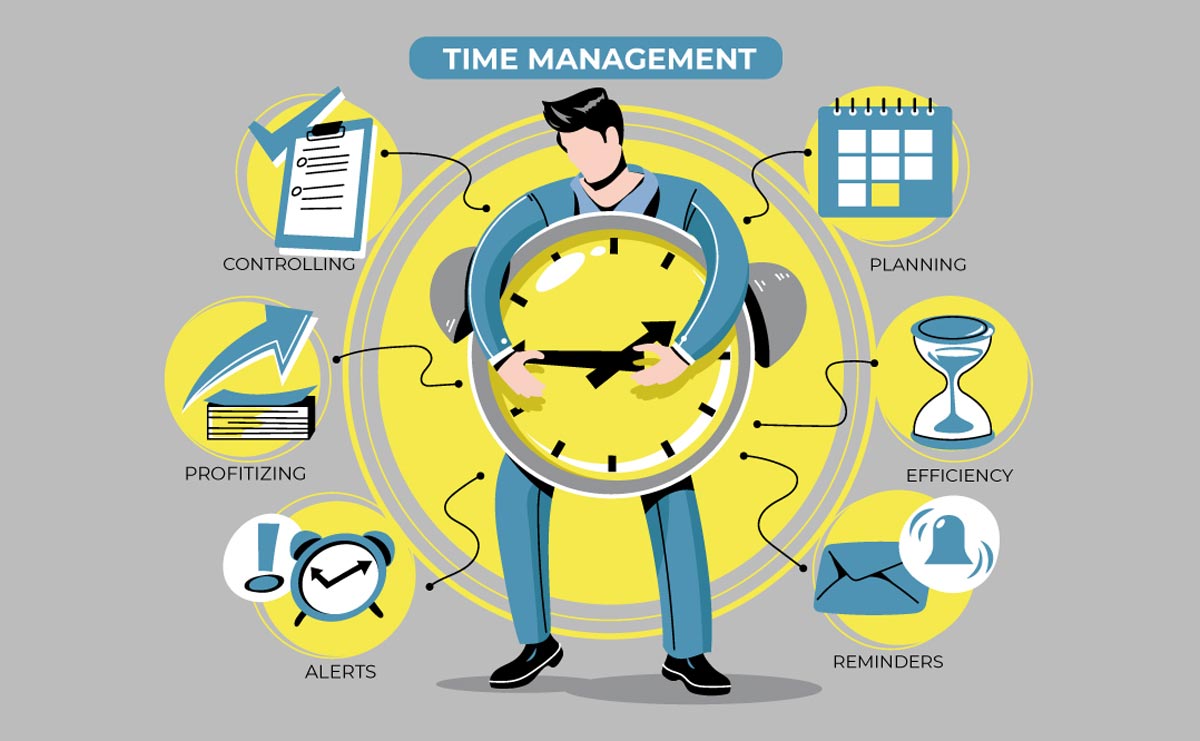Contents
Mastering Time Management for Lawyers: A Smart Guide
Time is the most precious asset in the legal field. Proper time management can make or destroy the worth of your work and the path of your career. Young lawyers should master time management for lawyers so that they can manage heavy workloads and requisite continuing education. The ultimate time management tool for lawyers can automate routine tasks, enhance concentration, and guarantee deadlines will never be missed. Acquiring these skills at a young age will provide a solid foundation for sustained success in the law.
Why Time Management Is Critical for New Lawyers
I. The Ticking Clock of Legal Practice
Time defines much of the legal profession. From billing hours to meeting strict court deadlines, every task is measured against the clock. New lawyers often find themselves overwhelmed by the constant pressure to perform efficiently within limited time frames. Failing to manage this pressure can lead to missed opportunities, overlooked details, and professional setbacks. Understanding the value of time is essential for developing a reliable and productive workflow early in one’s career.
II. Emotional Impact of Poor Time Management
Poor time management often leads to burnout, stress, and a sense of falling behind. Young attorneys are especially vulnerable to these effects, as they navigate steep learning curves, high expectations, and unfamiliar responsibilities. When tasks pile up or deadlines are missed, confidence suffers and performance declines. Establishing a realistic structure for handling workload demands is necessary to maintain both emotional stability and professional reputation.
III. Billing Hours vs. Personal Balance
Balancing billable hours with personal well-being is a unique challenge in legal practice. The focus on maximizing time billed to clients can create tension between productivity and health. For new professionals, this balance is difficult to achieve without the right support systems in place. Implementing time management for lawyers requires a mindset that values both efficiency and sustainability. Tools like time management software for lawyers help reinforce this balance by organizing workloads and reducing administrative burden.
IV. Building a Strong Foundation for Career Growth
Time discipline is not just about meeting daily responsibilities. It also sets the stage for long-term growth. Lawyers who manage time effectively gain the trust of colleagues, supervisors, and clients. They are more likely to be given leadership roles, critical cases, and high-profile assignments. As early habits shape future performance, investing in strong time management skills is one of the most important steps for a successful legal career.

Building Smart Habits with Time Management Software for Lawyers
I. Choosing the Right Legal Calendaring Tool
Legal professionals operate in a complex environment with numerous overlapping deadlines, court appearances, and client meetings. Selecting a calendaring tool that aligns with legal workflows is crucial. An ideal solution should allow lawyers to set custom reminders, integrate with other legal systems, and provide visibility across teams. Beyond basic scheduling, the tool must support strategic planning and adaptability, allowing for adjustments as priorities evolve. Reliable legal calendaring is one of the most important assets in building effective time management.
II. Automating Deadline Tracking
Manual tracking of legal deadlines is risky and time-consuming. By automating this process, attorneys can reduce the likelihood of human error while increasing efficiency. Time management for lawyers depends heavily on consistent execution, and automation ensures that deadlines are neither missed nor forgotten. The best systems automatically update deadlines based on court rules and procedural timelines, saving valuable time and mental bandwidth. As cases grow more complex, these features become essential for maintaining order and meeting obligations.
III. Integrating Task Reminders and Goals
An effective time management software for lawyers includes tools for organizing daily tasks and aligning them with long-term objectives. Features like task lists, status updates, and goal tracking allow attorneys to monitor progress across multiple matters. These systems also support better communication within legal teams by making priorities and responsibilities clear. For young lawyers, this level of structure is especially helpful as it provides both accountability and visibility into overall workload. Building these habits early contributes to a more organized and sustainable practice.
IV. Enhancing Focus and Reducing Distractions
Time is easily lost in the constant shift between emails, calls, and case updates. Time management software helps centralize information, reducing the time spent switching between platforms. With a clear interface and intuitive navigation, these tools support deep work and reduce interruptions. For new attorneys trying to build momentum in their roles, minimizing distractions can make a significant difference in performance and confidence. The more time spent on focused legal work, the greater the value delivered to clients and supervisors.
V. Creating Consistency Across Workflows
A standardized system benefits not only the individual lawyer but also the entire firm. Consistent use of time tracking, task management, and calendaring software improves coordination, reduces redundancies, and ensures accountability across teams. Time management in a legal context must go beyond individual habits; it requires systemic support. By using the same tools and following shared processes, legal teams can operate more cohesively and deliver better results. This consistency becomes a competitive advantage in a field where precision and reliability are paramount.
Using Your Calendar as a Lawyer’s Strategic Weapon
I. Scheduling Internal Deadlines and Prep Time
A professional calendar should serve as more than a log of external obligations. New lawyers must learn to schedule internal deadlines for each major task, allowing adequate preparation time and reducing last-minute pressure. Breaking large assignments into smaller, time-blocked segments improves execution and reduces risk of oversight. This practice promotes better time management by encouraging proactive planning instead of reactive responses. Blocking specific hours for research, drafting, and review ensures steady progress and higher quality output.
II. Blocking Time for Self-Check-ins
Consistent self-evaluation is necessary to stay aligned with professional objectives. Lawyers should set recurring calendar events to assess workload, review goals, and adjust timelines as needed. These check-ins help identify what is working and where delays are occurring. Time management for lawyers must include reflection, allowing professionals to make informed changes to their routine. Such sessions also provide space to address areas of improvement before they affect performance or client outcomes.
III. Syncing Legal Calendars Across Devices
Accessibility is critical for attorneys who often work across locations and devices. Legal calendars should be synced in real time across desktops, smartphones, and tablets to ensure updates are never missed. Calendar tools integrated into time management software for lawyers often support this functionality, allowing uninterrupted access to schedules. This flexibility reduces friction and supports better coordination, especially in fast-paced legal environments. Real-time syncing enhances awareness and minimizes the chance of scheduling conflicts or overlooked commitments.
IV. Planning with Flexibility and Structure
Legal work is subject to change, and rigid planning can become counterproductive. A structured calendar that still allows room for adjustments is essential. Lawyers should design their schedule with buffers to accommodate unexpected developments, including urgent client issues or court rescheduling. Balancing structure with flexibility ensures consistent productivity without sacrificing responsiveness. Time management in legal practice requires tools and habits that support this dual need, and the calendar is one of the most effective instruments to achieve that balance.
Holding Yourself Accountable to Stay on Track
I. Treat Your Schedule Like Client Time
Accountability begins with how lawyers treat their own time. Each scheduled entry—whether a deadline, a review session, or a planning block—should be approached with the same level of respect as a client meeting. Ignoring personal calendar entries sets a precedent for delay and disorganization. Developing a discipline around time management ensures that important, non-urgent tasks do not fall through the cracks. Over time, this habit strengthens reliability and supports consistent professional growth.
II. Use Peer Check-ins for Consistency
Support systems can reinforce personal discipline. Setting regular check-ins with a colleague or mentor helps maintain focus and accountability. These sessions can include reviewing progress on key projects, discussing upcoming priorities, and identifying areas for adjustment. Time management for lawyers benefits from collaboration, as shared discussions often reveal more efficient approaches to handling workload. Peer accountability also encourages a culture of mutual support and continuous improvement within the legal team.
III. Review and Adjust Weekly Priorities
A structured review at the beginning of each week is essential to maintaining alignment with deadlines and expectations. Lawyers should evaluate their upcoming tasks, compare them to their long-term goals, and adjust accordingly. This ensures that time is allocated where it provides the most value, reducing stress caused by last-minute changes. Time management software for lawyers often includes features like task categorization and progress tracking, which streamline this process. With a clear overview of obligations, lawyers can plan their week with confidence and precision.
IV. Building Habits That Reinforce Accountability
Accountability is not a one-time decision but a sustained effort supported by routine. Setting time aside each day to review completed tasks and update progress fosters transparency and efficiency. Over time, these practices become embedded in the lawyer’s workflow, creating a structured approach to time use. This internal discipline is key to managing complex caseloads and delivering consistent results. Through repeated, intentional practice, accountability transforms from a challenge into a defining strength of professional conduct.
Efficient Time Management for Lawyers in Daily Work
I. Prioritize Tasks Based on Client Value
Every legal task varies in importance, urgency, and impact. To manage time effectively, attorneys must prioritize based on the value delivered to the client. This involves understanding the context of each case, recognizing what actions move it forward, and focusing effort accordingly. Effective time management is not just about working faster; it is about directing attention to the tasks that matter most. Lawyers who align their workflow with client outcomes not only increase efficiency but also build trust and credibility.
II. Reduce Over-Research and Over-Writing
Thorough legal research and drafting are important, but they must be balanced with practicality and scope. Spending excessive time perfecting non-critical elements can lead to inefficiency. Time management for lawyers requires the ability to assess when a task is complete enough to serve its purpose without wasting additional time. Applying the principle of “good enough” for internal memos or initial drafts can significantly reduce time spent on routine work. This enables lawyers to allocate more time to high-impact responsibilities.
III. Match Work Effort to Case Complexity
Not all cases demand the same level of detail and review. New lawyers should learn to scale their work based on the nature and complexity of the matter. For example, a routine contract review may not require the same time investment as a motion in a high-stakes litigation. Time management software for lawyers can help by tagging tasks, setting time estimates, and tracking completion times, allowing better alignment between effort and case demands. Using these insights, lawyers can refine how they allocate their time for optimal productivity.
IV. Delivering Quality Without Delay
Efficiency does not mean sacrificing quality. The objective is to maintain high standards while completing tasks within reasonable timelines. This requires focused work sessions, clear communication, and consistent follow-through. Legal professionals who build efficient habits increase their output without reducing the value of their work. Over time, this balance of speed and accuracy becomes a defining advantage in competitive legal environments.
Respecting Other People’s Time in a Law Firm
I. Ask Questions the Smart Way
Clear and considerate communication is essential in any legal setting. New lawyers should avoid interrupting colleagues with unplanned or frequent inquiries. Instead, questions should be grouped, organized, and addressed during scheduled meetings or designated discussion times. This approach minimizes disruption and shows respect for others’ responsibilities. Practicing effective time management begins with recognizing the importance of everyone’s schedule, not just your own.
II. Use Clear and Concise Subject Lines
Legal professionals receive a high volume of emails each day. To ensure messages are read and acted upon, subject lines must be specific, informative, and aligned with the content. A generic title such as “Update” offers little clarity, while a subject like “Acme Case: Draft Settlement Terms for Review” allows immediate recognition. Time management for lawyers depends on these small but critical practices that save time and reduce the risk of miscommunication. Thoughtful formatting improves responsiveness and overall efficiency in firm communication.
III. Keep Emails Brief and Actionable
Well-written emails are both brief and structured. The key message or request should appear at the beginning, with supporting context provided as needed. When action is required, deadlines should be clearly marked through formatting or concise phrasing. Avoid overly long messages that require recipients to sift through excessive text. Lawyers who communicate clearly are more likely to receive prompt and accurate responses. Time management software for lawyers often includes built-in templates or formatting tools that reinforce these habits and standardize communication workflows.
IV. Demonstrating Professional Courtesy
Respecting others’ time is a sign of professionalism and collaboration. Punctuality, preparation, and brevity reflect a commitment to shared goals and a functional workplace culture. Whether in meetings, emails, or discussions, being mindful of how time is used reinforces trust and reliability. These habits contribute to a more organized and effective legal team, where productivity is supported by mutual respect. Building a reputation for efficient, respectful communication can positively influence long-term career advancement.
Creating Time for Career Growth and Personal Life
I. Set Boundaries That Support Your Goals
New lawyers often struggle to find time for personal development while meeting demanding professional expectations. Setting boundaries is not a limitation but a strategic choice that protects both energy and focus. Blocking time for reading, learning, or networking allows for steady career advancement beyond daily casework. Effective time management includes making deliberate decisions about where time is invested. Lawyers who set clear boundaries are better equipped to handle responsibilities without sacrificing long-term aspirations.
II. Say No When Necessary—With Confidence
Not every opportunity contributes to meaningful progress. Learning when and how to say no is essential for managing workload and avoiding burnout. Time management for lawyers requires the ability to evaluate which requests align with professional goals and which do not. Declining assignments that interfere with higher priorities ensures time is used where it delivers the most benefit. As experience grows, the ability to make these choices with confidence becomes an important part of career development.
III. Reclaim Time for Hobbies, Health, or Rest
Sustainable performance in law depends on more than billable hours and completed tasks. Reclaiming time for rest, exercise, hobbies, or personal commitments strengthens mental clarity and emotional resilience. A balanced routine supports not only individual well-being but also better decision-making and client service. Time management software for lawyers can assist in this by organizing schedules in a way that highlights available time for non-work activities. A system that integrates both professional and personal priorities creates a more realistic and rewarding career path.
IV. Building a Fulfilling Legal Career
A successful legal career includes more than courtroom victories or promotions. It involves building a life that reflects personal values and professional growth. Lawyers who take ownership of their time are more likely to develop lasting satisfaction in their roles. This requires not only planning but also the discipline to maintain boundaries and the vision to pursue meaningful goals. With the right structure and mindset, it is possible to meet high standards while preserving space for what matters beyond work.
Practicing Gratitude: The Final Pillar of Time Management
I. Celebrate Small Wins Daily
The legal profession often emphasizes results over reflection. However, taking time to acknowledge progress—even minor achievements—can improve morale and strengthen motivation. Lawyers who recognize daily accomplishments develop a more positive outlook and greater resilience in the face of challenges. Incorporating gratitude into time management fosters a sense of purpose and reduces the stress associated with constant deadlines. By appreciating incremental gains, professionals create a more sustainable and satisfying workflow.
II. Stay Mindful to Reduce Stress
Mindfulness supports clearer thinking and better decision-making. Practicing gratitude helps lawyers remain grounded during high-pressure situations and encourages more intentional time use. Time management for lawyers is not only about scheduling and efficiency; it also involves maintaining perspective and emotional balance. A calm, reflective mindset allows for more strategic planning and less reactive behavior, both of which are essential in complex legal environments.
III. Use Reflection as a Time Management Tool
Reflection transforms experience into insight. Lawyers who regularly pause to consider what went well, what could improve, and what matters most are better equipped to refine their habits. Time management software for lawyers can support this process by tracking performance metrics and offering visibility into patterns of behavior. Reviewing this data through the lens of gratitude highlights both strengths and opportunities. Reflection, when guided by appreciation rather than criticism, promotes growth and reinforces long-term professional development.
IV. Sustaining a Positive and Productive Legal Career
Gratitude is not a passive emotion—it is a discipline that strengthens focus and enhances professional identity. Legal work will always involve pressure, deadlines, and competing priorities. However, lawyers who cultivate gratitude are better positioned to manage these demands with confidence and clarity. When paired with structured planning and goal-setting, gratitude becomes a powerful tool for sustainable time management and a fulfilling career.
Turning Time into Your Strongest Asset
For new attorneys, the path to success is shaped not only by knowledge and skill, but by how well time is managed. Developing strong time management habits early in your legal career can greatly improve productivity, reduce stress, and help you meet both client and firm expectations. Understanding the principles of time management for lawyers—prioritization, communication, and accountability—will position you to handle growing responsibilities with confidence and professionalism.
Equipping yourself with reliable tools is just as important as building good habits. The right time management software for lawyers can streamline your day, keep you organized, and ensure nothing slips through the cracks. Whether you’re juggling multiple cases, coordinating with teams, or striving for work-life balance, smart use of your time is a key advantage. When managed well, time becomes more than just a resource—it becomes a strategic asset in building a successful and sustainable legal career.
Ready to Take Control of Your Time and Practice?
RunSensible is more than just legal software—it’s your all-in-one platform for smarter law firm management. From integrated calendaring and case tracking to automated client intake, billing, and document management, RunSensible brings everything into one streamlined system. Whether you’re a solo attorney or part of a growing firm, our platform helps you stay organized, save time, and focus on what matters most: delivering results for your clients.
Try RunSensible today and experience how modern legal software can transform your workflow, boost productivity, and simplify your entire practice.
FAQs
1. What is time management, and why is it important for lawyers?
Time management refers to the process of planning and organizing how to divide your time between specific activities. For lawyers, effective time management is essential to meet deadlines, handle multiple cases, and maintain a high standard of client service without experiencing burnout.
2. How can time management for lawyers improve productivity?
Time management for lawyers helps prioritize tasks, avoid unnecessary delays, and reduce time spent on administrative work. By organizing their schedules and focusing on high-value activities, lawyers can increase efficiency and achieve better results for their clients.
3. What are the common challenges in time management for lawyers?
Lawyers often face conflicting deadlines, unexpected client demands, and a high volume of documentation. These factors make it difficult to manage time effectively without a clear structure or system in place, leading to stress and potential errors.
4. Why should legal professionals use time management software for lawyers?
Time management software for lawyers offers tools like calendar integration, task automation, and deadline reminders. These features help legal professionals stay organized, reduce manual effort, and ensure that no important task or date is overlooked.
References
- http://lifehackmethod.com/blog/time-management-for-lawyers/
- http://toggl.com/blog/best-time-tracking-software-lawyers
- http://lawbillity.com/post/mastering-time-management-7-essential-tips-for-law-firms/
- http://www.realsimple.com/pomodoro-technique-8777975
- http://atticusadvantage.com/blog/5-proven-strategies-for-lawyers-to-protect-their-time-and-avoid-burnout/
- http://ysamphy.com/time-management-for-lawyers-12-tips-for-maximum-productivity/
Disclaimer: The content provided on this blog is for informational purposes only and does not constitute legal, financial, or professional advice.







